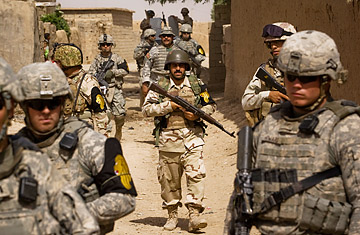
Iraqi, Kurdish and U.S. forces conduct a village-clearance operation in the hunt for insurgent activity on June 11, 2010, in Ali Ayun, Iraq.
Major U.S. combat operations in Iraq were first declared to have ended in March 2003, in President Bush's infamous "Mission Accomplished" address aboard the U.S.S. Abraham Lincoln. Seven years and many thousands of casualties later, President Barack Obama made a similar announcement this week. But it remains to be seen whether his note of finality has any more traction than that of his predecessor.
It's not hard to see why many skeptics see little more than a rebranding message in President Obama's announcement that U.S. troop levels in Iraq will soon stand at 50,000 and that their mission would be to "train and advise Iraqi security forces, conduct partnered and targeted counterterrorism operations and protect ongoing U.S. civilian and military efforts." For one thing, that's what they've been doing for quite some time now, in keeping with the 2008 Status of Forces Agreement (SOFA) concluded between the Bush Administration and the Iraqi government. The SOFA moved U.S. troops out of Iraq's cities last summer and ended independent U.S. military operations — today they're required to operate in tandem with Iraqi forces. (The agreement also requires that all U.S. forces be gone by the end of next year; that was not a timeline set by President Obama.)
More important, the remaining "transition" force is not exactly a noncombatant one, even if it's no longer taking the lead in fighting the insurgency. U.S. forces still go out on combat patrols with Iraqi forces, and protecting U.S. personnel is still a combat mission because some of the 94 U.S. bases that remain in Iraq are frequently attacked by insurgents. Iraqi forces still rely heavily on U.S. forces for air and artillery support. And the U.S. has a more active role in more contested areas, such as the northern city of Mosul, which remains a hotbed of the Sunni insurgency and also a site of Arab-Kurd tension.
When it comes to the traditional function of a nation's military — protecting the sovereignty of its borders and air space, rather than fighting a domestic insurgency — the Iraqis are still heavily reliant on the U.S., and American military officials freely admit that Iraq will likely need the U.S. in that respect long after 2011. Indeed, Iraq's own military chief said recently that his country's forces won't be able to operate without a U.S. presence until 2020.
The question of the capabilities of the Iraqi security forces and their ability to maintain security are intimately related to the country's political fortunes; soldiers of a national army are motivated by a desire to protect that nation's borders and institutions, but the political impasse in Iraq is a sharp reminder of the fragility of the country's national cohesion. Some five months after the election to choose a new government, the situation is still murky. The next Prime Minister is not likely to be the incumbent, Nouri al-Maliki, because he appears to have lost the backing of radical Shi'ite cleric Muqtada al-Sadr, without whose support neither he, nor his archrival, former U.S.-appointed Prime Minister Iyad Allawi, are likely to muster a governing coalition.
But al-Sadr, a Shi'ite partisan currently living in Iran and a fierce opponent of the U.S. presence, won't necessarily throw his support behind Allawi, a longtime Washington asset who was previously appointed Prime Minister by the Coalition Provision Authority. Instead, he may back another former Prime Minister, Ibrahim al-Jaafari. But al-Jaafari's previous term in charge, at the height of the sectarian civil war, was hardly encouraging. There's still plenty of potential for sectarian splits in the political system that, if unresolved, could eventually divide the security forces. And the U.S. ability to influence the political process has become increasingly marginal.
While it would be an exaggeration to describe the current situation in Iraq as a power vacuum, there's clearly a worrisome drift — so much so that the Obama Administration recently dispatched a phalanx of officials to work with Iraq's politicians in the hope of helping produce a compromise. The concern is that any decline in the security situation or uptick in communal violence will stretch the capabilities of the Iraqi security forces, and the residual U.S. force will be called upon to provide backup.
In May 2007, before the political situation in Iraq forced its government to demand a timetable for U.S. withdrawal, President Bush had envisaged a long-term U.S. military presence in Iraq along the lines of the one in South Korea — where 28,500 U.S. troops currently serve. Despite the tenor of Obama's address this week, his predecessor may yet get his wish.
